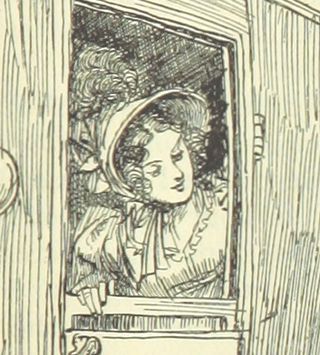Julia is a usually feminine given name. It is a Latinate feminine form of the name Julio and Julius. The given name Julia had been in use throughout Late Antiquity but became rare during the Middle Ages, and was revived only with the Italian Renaissance. It became common in the English-speaking world only in the 18th century. Today, it is frequently used throughout the world.

Eva is a female given name, the Latinate counterpart of English Eve, which is derived from the Hebrew חַוָּה (Chava/Hava), meaning "life" or "living one", the name of the first woman according to the Hebrew Bible. It can also mean full of life or mother of life. It is the standard biblical form of Eve in many European languages. Evita is a diminutive form, in Spanish.
Josephine is a female given name. It is the English version of the French name Joséphine, itself a female variant of the name Joseph, which is ultimately derived from the Hebrew name Yosef, meaning "he shall add/grow".

Harriet is a female name.

Sarah is a common feminine given name of Hebrew origin. It derives its popularity from the biblical matriarch Sarah, the wife of Abraham and a major figure in the Abrahamic religions. It is a consistently popular given name across Europe, North America, and the Middle East — being commonly used as a female first name by Jews, Muslims, and Christians alike, and remaining popular also among non-religious members of cultures influenced by these religions.
Bella is a feminine given name. It is a diminutive form of names ending in -bella. Bella is related to the Italian, Spanish, Greek, Portuguese and Latin words for beautiful, and to the name Belle, meaning beautiful in French.

Hannah spelled Hanna, Hana, Hanah, or Chana, is a feminine given name of Hebrew origin. It is derived from the root ḥ-n-n, meaning "favour" or "grace"; A Dictionary of First Names attributes the name to a word meaning 'He (God) has favoured me with a child'. Anne, Ana, Ann, and other variants of the name derive from the Hellenized Hebrew: Anna.
Louise and Luise are, respectively, French and German feminine forms of the given name Louis. Louise has been regularly used as a female name in English speaking countries since the middle of the 19th century. It has ranked among the top 100 names given to girls in France, England, Ireland, Scotland, Sweden and Wales in recent years. It last ranked among the top 1,000 first names for girls born in the United States in 1991, but remains a more common middle name.
Grace is a female name from the Latin gratia. It is often given in reference to the Christian concept of divine grace and used as a virtue name.

Emily is a feminine given name derived from the Roman family name "Aemilius", and is the feminine form of the name Emil.

Elizabeth is a feminine given name, a variation of the Hebrew name Elisheva (אֱלִישֶׁבַע), meaning "My God is an oath" or "My God is abundance", as rendered in the Septuagint.

Emma is a feminine given name. It is derived from the Germanic word ermen, meaning "whole" or "universal". It likely originated as a short form of names such as Ermengarde or Ermentrude. Its earliest use begins at least from the early seventh century, with Frankish royal daughter Emma of Austrasia and the wife of Eadbald of Kent found in written sources. Its popularity in the medieval era increased because it was the name of Emma of Normandy, mother of Edward the Confessor. Emmeline is a Norman variant of Emma that was introduced to England by the Norman invaders in the 11th century. The name is etymologically unrelated to Amalia, Amelia, Emilia, and Emily, all of which are derived from other sources, but all of these names have been associated with each other due to their similarity in appearance and sound. Emma has been used as a short form of some of these names or shares diminutives such as Em or Emmy with them.

Laura is a traditionally feminine given name in Europe and the Americas, of Latin origin, whose meaning is a metonym for a victor, and an early hypocorism from Laurel and Lauren.
Marie is a variation of the feminine given name Maria.
Nora is a feminine personal name. It mainly originates as a short form of Honora, a common Anglo-Norman name, ultimately derived from the Latin word Honor. In Hungary, the name Nóra originates as a short form of Eleonóra.
Alicia is a feminine given name. It is a variant of Alice, which comes from the Germanic name Adalheidis (Adelaide), meaning "noble natured".
Annie is the diminutive of feminine given names such as Anna, Ann, Anne, Annette, Anita, Andrea, Angela, Anastasia and other variations. It may refer to:
Stella is a female given name. It is derived from the Latin word for star. It has been in use in English-speaking countries since it was first used by Philip Sidney in Astrophel and Stella, his 1580s sonnet sequence. Use might also have increased due to Stella Maris as a title for the Virgin Mary by Catholics. Alternately, it is a feminine version of the Greek name Stylianos, meaning pillar.
Caroline is a feminine given name, derived from the male Charles. Common nicknames and variations include Callie, Carol, Carole, Carolina, Carolyn, Carly, Carrie, and Caz.
Frances is an English given name of Latin origin. In Latin the meaning of the name Frances is 'from France' or 'free one.' The male version of the name in English is Francis. The original Franciscus, meaning "Frenchman", comes from the Franks who were named for the francisca, the axe they used in battle.








